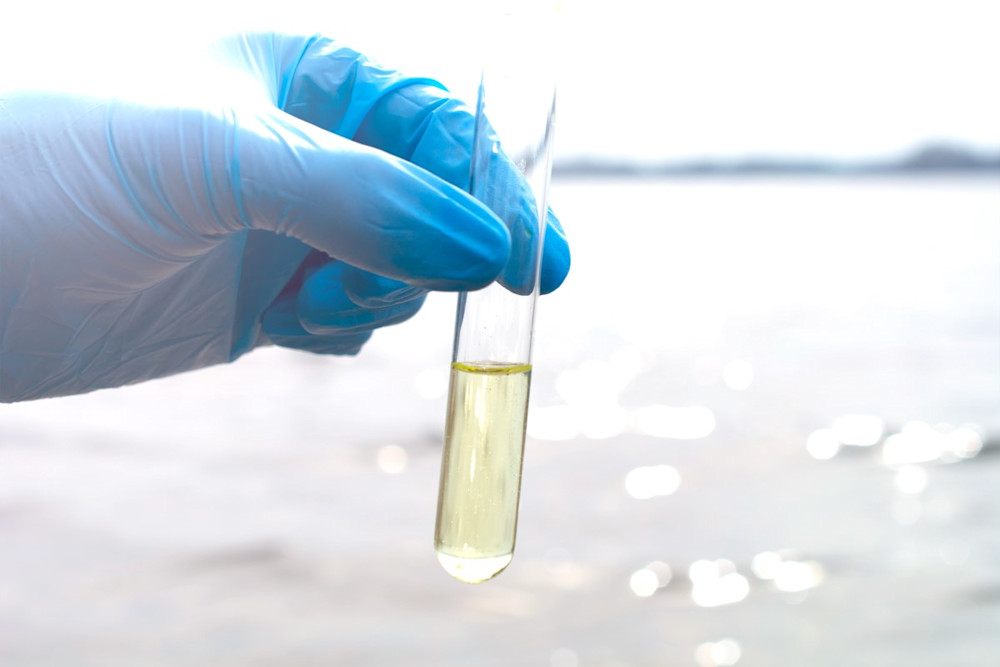ICP-MS Analysis
Inductively coupled plasma-mass spectrometry (ICP-MS) is a highly sensitive chemical analysis method that yields quantitative results on elements and their isotopes in samples at milligram to nanogram levels per liter. ICP-MS has many applications, from water purity testing to trace element analysis in materials science.

Check out our ICP-MS testing services
Specific migration testing – elements of Annex II in Commission Regulation (EU) No 10/2011
Specific migration testing – ammonium ion and elements of Annex II in Commission Regulation (EU) 2020/1245
Heavy metal (Pb, Cd, As, Hg) analysis package
Migration of heavy metals according to the Finnish Degree (KTM) 268/1992
Heavy metal content according to Directive 94/62/EC
ICP-MS for thin films on wafers
ICP-MS measurement (wide) for water samples
Migration of heavy metals from ceramics, glass, and enameled articles
Prices excluding VAT (24 %).
- Fast turnaround times
- Personal service from method experts
- Competitive prices
- Result accuracy guarantee
What is ICP-MS?
ICP-MS is a high throughput elemental analysis method that is capable of detecting most of the elements in the periodic table. Modern ICP-MS instruments offer linear dynamic ranges up to twelve orders of magnitude. This enables simultaneous analysis of major and minor elemental components of the sample.
Besides low-concentration (ppb=parts per billion=µg/l) accuracy, ICP-MS performs reliably in ultra-low concentrations (ppt=parts per trillion=ng/l and even ppq=parts per quadrillion). The method is capable of measuring atomic mass ranging from 7 to 250, which means that it detects elements from lithium to uranium. ICP-MS can also distinguish different isotopes of elements.
How does ICP-MS work?
ICP-MS uses high-temperature plasma that breaks down the chemical compounds in the samples to their atomic ions. After this, mass spectrometry is used to detect and quantify the ions to distinguish different elements and, in some cases, their isotopes.
Inductively coupled plasma-mass spectrometry is most often used to analyze solid or liquid samples, but gas analysis is also possible. Most common ICP-MS instruments rely on liquid injection, meaning that solid and gaseous samples must be dissolved into liquids before the analysis. With solid samples, this is most often achieved through acid digestion with hot mineral acids. An example of such a pretreatment method for solids is vapor phase decomposition, which can be combined with ICP-MS in VPD-ICP-MS analysis. Gases, on the other hand, can be trapped in suitable liquids by bubbling.
If sufficient results cannot be achieved through the pretreatment of solid or gaseous samples, special instruments can be used to investigate these samples without dissolving pretreatment. For example, LA-ICP-MS (laser ablation inductively coupled plasma mass spectrometry) can be used to analyze the surfaces of solid samples directly.
The difference between ICP-MS and ICP-OES
The principle of ICP-MS is measuring the mass of the atoms through mass spectrometry, as explained above. ICP-OES (inductively coupled plasma-optical emission spectroscopy) on the other hand, is based on analyzing the wavelengths of the excited atoms and ions within the elements in the sample.
The difference in use cases is that ICP-OES is a more robust method for analyzing samples that have a higher amount of total dissolved solids and stricter regulations. Examples of this type of sample are groundwater, wastewater, soils, and solid waste.
What is ICP-MS analysis used for?
ICP mass spectrometry is most often used in multi-element trace studies. It can, for example, be used to analyze heavy metal contamination of food, water, consumer goods, or pharmaceutical products. Other trace metal studies are also common. In solvent purity assays, ICP-MS can be combined with GC-FID and Karl Fischer titration to obtain comprehensive data on possible contaminants.
Suitable sample matrices
- Raw materials
- Waste
- Drinking and process water
- Impurities in drugs and pharmaceuticals
- Biomass
- Environmental measurements
- Mining, rocks and minerals
- Catalysts
- Isotope studies
- Organic polymers
- Food and beverages
- Semiconductor materials
Ideal uses of ICP-MS
- Detection of elements from lithium to uranium, including different isotopes
- Environmental analyses
- Heavy metal content determination
Ask for an offer
Fill in the form, and we'll reply in one business day.
Have questions or need help? Email us at info@measurlabs.com or call +358 50 336 6128.
Frequently asked questions
ICP-MS has many applications, as it can detect elemental impurities and toxins within a sample. One common use is to test water and soil samples in ecological studies.
ICP-MS analysis is also used in the food industry to find contaminants within products. In the pharmaceutical industry, ICP-MS is used to screen for inorganic impurities in drugs.
ICP-MS can't be used for the detection of hydrogen, helium, carbon and a few other light elements.
ICP-MS is suitable for most sample matrices, including liquids, gases, and solids.
Measurlabs offers a variety of laboratory analyses for product developers and quality managers. We perform some of the analyses in our own lab, but mostly we outsource them to carefully selected partner laboratories. This way we can send each sample to the lab that is best suited for the purpose, and offer high-quality analyses with more than a thousand different methods to our clients.
When you contact us through our contact form or by email, one of our specialists will take ownership of your case and answer your query. You get an offer with all the necessary details about the analysis, and can send your samples to the indicated address. We will then take care of sending your samples to the correct laboratories and write a clear report on the results for you.
Samples are usually delivered to our laboratory via courier. Contact us for further details before sending samples.